October 12th, 2010 by Dave Griffiths
Naked on Pluto is not this greedy, but it’s interesting what you can do from a facebook application. Would you click on “allow”:
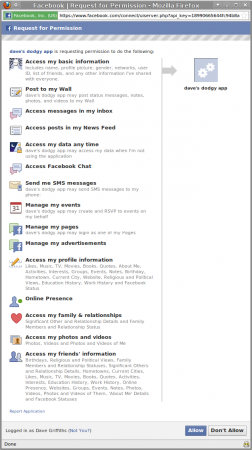
Tags: extended permissions interface design scary
Posted in technical | No Comments »
October 9th, 2010 by Marloes de Valk
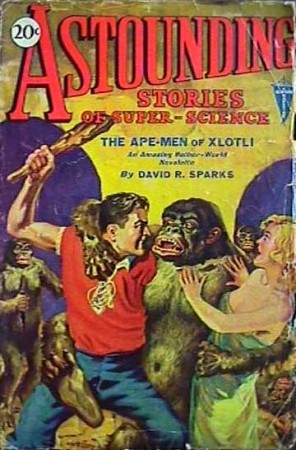
Plutonian Striptease is a series of interviews with experts, owners, users, fans and haters of social media, to map the different views on this topic, outside the existing discussions surrounding privacy.
Florian Cramer‘s background is comparative literature and art history with a focus on experimental arts, media, poetics and aesthetics. From 2006 to 2010, he was responsible for the Networked Media Master programme of the Piet Zwart Institute. Since 2008, he works as an applied research professor (Dutch: “lector”) supervising the research programme Communication in a Digital Age of the Piet Zwart Institute.
Social networks are often in the news, why do you think this is?
I see two major reasons: One, social networks have popularized classical Internet communication with accessible interfaces. So finally, everyone – including journalists – understands Internet as more than just an electronic distribution channel, and has also been cured from the “cyberspace”, “hypermedia” and “virtual reality” memes. But as a result, functionality and communication culture that has always been a core feature of the Internet is falsely being perceived as new, as a “social media revolution”.
The second reason is widespread job anxiety among the makers of the traditional news media, and those who indirectly live on the food chain of classical mass media production. Research suggests that younger people devote most of their media attention to social networks and “Web 2.0” services. At the same time, nobody except Google and, to a lesser degree, Facebook has figured out a revenue model for them. They help making traditional media marginal, but don’t create equivalent work opportunities for ‘creatives’ – designers, writers, etc. Contrary to the common belief that “social media” brought a shift from centralized one-to-many communication to a decentralized and self-organized model, just the opposite is true in regards to media ownership. A culture of countless local newspapers and TV stations, for example, is being replaced with a few global players in the Internet. The days where filmmakers could live from making MTV video clips, where critics could survive outside academia as newspaper and magazine writers and artists lived from jobs in the advertising industry are almost over. The strong news media coverage of social network mirrors the respective anxiety of the editors. Read more »
Tags: advertisement, communication, data leaks, data mining, EULA, illusion of intimacy, interface design, Internet, jobs, privacy, self-surveillance, social networks, web 2.0
Posted in contextual, interview | 4 Comments »
October 3rd, 2010 by Marloes de Valk
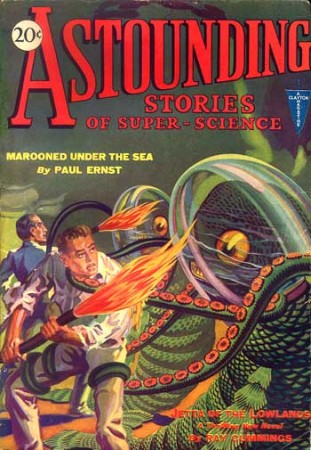
Plutonian Striptease is a series of interviews with experts, owners, users, fans and haters of social media, to map the different views on this topic, outside the existing discussions surrounding privacy.
Marc Garrett is Co-director and co-founder, with artist Ruth Catlow of the Internet arts collectives and communities – furtherfield.org, furthernoise.org, netbehaviour.org, also co-founder and co-curator/director of the gallery space HTTP Gallery in London, UK. Co-curating various contemporary Media Arts exhibitions, projects nationally and internationally.
Net artist, media artist, curator, writer, street artist, activist, educationalist and musician. Emerging in the late 80’s from the streets exploring creativity via agit-art tactics. Using unofficial, experimental platforms such as the streets, pirate radio such as the locally popular ‘Savage Yet Tender’ alternative broadcasting 1980’s group, net broadcasts, BBS systems, performance, intervention, events, pamphlets, warehouses and gallery spaces. In the early nineties, was co-sysop (systems operator) for a while with Heath Bunting on Cybercafe BBS, dedicated to arts, technology and hacking.
Social networks are often in the news, why do you think this is?
I find this quite a complex question. There are a few reasons why social networks are often reported more readily and regularly represented by traditional media news outlets. The main reason can be put down to social media’s popularity in everyday culture, connecting with people’s everyday habits and behaviours through different forms of networked, communication gadgets and tools. The massification of easy interaction, demanding hardly any thought in how to use the technologically, on-line networked and mobile interfaces, makes them perfect conduits for distributed information and communication. Read more »
Tags: data body, data mining, EULA, gadgets, net neutrality, patents, privacy, self censorship, social networks, web 2.0
Posted in contextual, interview | 3 Comments »
September 29th, 2010 by Marloes de Valk
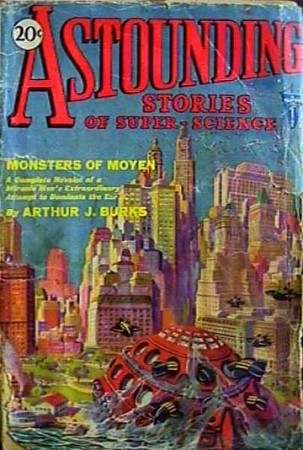
Plutonian Striptease is a series of interviews with experts, owners, users, fans and haters of social media, to map the different views on this topic, outside the existing discussions surrounding privacy.
Geert Lovink, founding director of the Institute of Network Cultures, is a Dutch-Australian media theorist and critic. He holds a PhD from the University of Melbourne and in 2003 was at the Centre for Critical and Cultural Studies, University of Queensland. In 2004 Lovink was appointed as Research Professor at the Hogeschool van Amsterdam and Associate Professor at University of Amsterdam. He is the founder of Internet projects such as nettime and fibreculture. His recent book titles are Dark Fiber (2002), Uncanny Networks (2002) and My First Recession (2003). In 2005-06 he was a fellow at the WissenschaftskollegBerlin Institute for Advanced Study where he finished his third volume on critical Internet culture, Zero Comments (2007).
Social networks are often in the news. Why do you think this is the case?
“Who cares about the internet!” is a phrase I heard kids saying the other day. If only we were there… Internet, the forgotten medium. It is indeed true that I have gotten used to the fact that the internet is overhyped and constantly in news over the past 15 years. Social media is just the latest craze, following terms such as Web 2.0 and the intense reporting around ‘blogging’. We should not forget that part of the urge to report is the fact that these social networking sites are in direct competition with ‘old media’ such as TV and print in terms of the ‘attention economy’ and related advertisement budgets. Read more »
Tags: advertisement, anonymity, attention economy, commodities, free services, friends, Internet, law, privacy, recommendation systems, trading, video, web 2.0
Posted in contextual, interview | 1 Comment »
September 24th, 2010 by Marloes de Valk
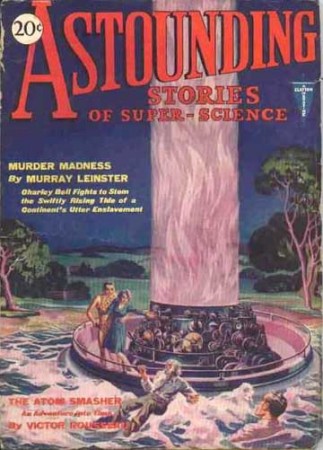
Plutonian Striptease is a series of interviews with experts, owners, users, fans and haters of social media, to map the different views on this topic, outside the existing discussions surrounding privacy.
Rob van Kranenburg lives in Ghent. He is in constant and full wonder about life in general and the human condition in particular.
Social networks are often in the news, why do you think this is?
It says more about the news now. It is clear that the idea of mass media itself is now adding to the core of problems; its hierarchical notion of gaining more attention or more ‘hits’ is fueling imbalances in the world.
In what way do they differ from older forms of communication on the Internet?
Simple people like me, with no money, no heritage, no support, felt relevant by the ability to publish anything they want on he internet. This is sanity to me. The social networks work like a bit of a tribe where old friends find you, you can quickly see where someone is. Read more »
Tags: balance, local communities, mass media, narcissism, privacy, self publishing, social networks, transparency, tribe
Posted in contextual, interview | 1 Comment »
September 22nd, 2010 by Marloes de Valk
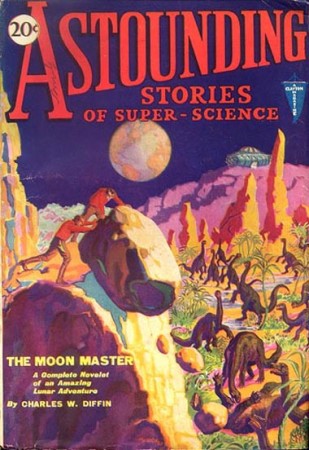
Plutonian Striptease is a series of interviews with with experts, owners, users, fans and haters of social media, to map the different views on this topic, outside the existing discussions surrounding privacy.
Geoff Cox is currently a Researcher in Digital Aesthetics as part of the Digital Urban Living Research Center, Aarhus University (DK). He is also an occasional artist, and Associate Curator of Online Projects, Arnolfini, Bristol (UK), adjunct faculty, Transart Institute, Berlin/New York (DE/US) and editor for the DATA Browser book series (published by Autonomedia).
Social networks are often in the news, why do you think this is?
Social networks, or more specifically the social web, are bound up with vested interests and the social imaginary. They have become key sites for entertainment, making business and even doing politics. Along with this, and as communications technologies become key sites for various forms of contestation, there are bound to be some juicy stories. In addition, social networks are becoming the apparatus of the news. On the one hand, there is the use of platforms for various kinds of social movements and alternative news gathering, and on the other, the old news apparatus is adapting itself to new kinds of distribution channels – rather like selling any other product. Read more »
Tags: communication, data, ethics, EULA, friends, Internet, marketing, ownership, privacy, property, rights, social networks, trading, venture capital, web 2.0
Posted in contextual, interview | 2 Comments »
September 19th, 2010 by Marloes de Valk
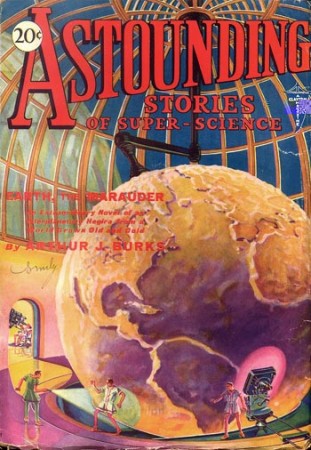
Plutonian Striptease is a series of interviews with experts, owners, users, fans and haters of social media, to map the different views on this topic, outside the existing discussions surrounding privacy.
Dmytri Kleiner is a USSR-born, Canadian software developer and cultural producer. He is a co-founder of Telekommunisten, a worker’s collective that provides telephone and Internet services, and an independent researcher investigating the role of telecommunications, cultural production and migration in class conflict.
Social networks are often in the news, why do you think this is?
Several reasons, on one hand social platforms like Facebook have gotten many new users into online communications, on the other hand, unlike older platforms like email and usenet, Social networks are run by capital financed companies, and thus have PR and marketing budgets.
In what way do they differ from older forms of communication on the Internet?
The primary difference is that they are centralized, proprietary platforms, each controlled by a single commercial organization. Read more »
Tags: decentralized systems, EULA, Facebook, identity theft, marketing, privacy, proprietary systems, social networks, venture capital
Posted in contextual, interview | 1 Comment »
September 9th, 2010 by aymeric
When Marloes, Dave and myself started to discuss about this Facebook game idea, we quickly agreed that we were more interested in using a text-only environment. It’s faster to develop, the constraint is a great catalyst for creativity, it forces you to approach gaming outside of the popular interface metaphors and, above all, it fits perfectly with the text fueled social media environments we want to describe.
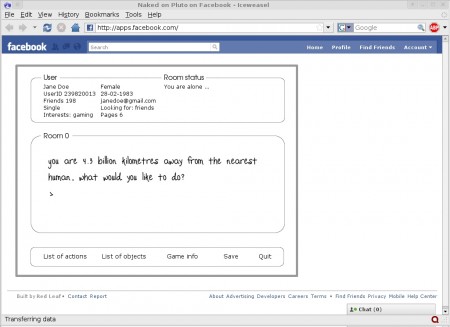
Read more »
Tags: book, chat, facebook data, interface design, inventory, mockup, status, text user interface, text-based game, work in progress
Posted in graphic design, interface design | 1 Comment »
September 8th, 2010 by Marloes de Valk
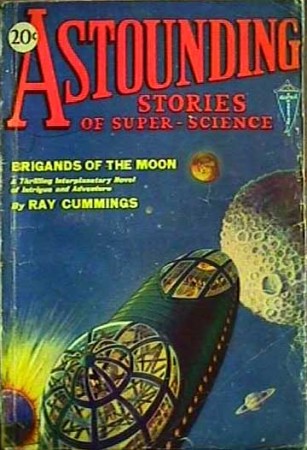
First in a series of interviews with experts, owners, users, fans and haters of social media, to map the different views on this topic, outside the existing discussions surrounding privacy.
Rob Myers is an artist, writer and hacker based in Peterborough, England. He is part of the GNU Social team. GNU social is a decentralized social network that you can install on your own server. Project catchphrase:
What if you could authorize your server to reveal as much, or as little information about you to other sites, as you wish… one time, one day, or forever?.
Social networks are often in the news, why do you think this is?
Often it’s moral panics of the sort that accompany the spread of any new technology. But there’s a growing awareness in old media that social networking software sites are starting to gain the kind of hold on human communication that postal, telegraph, and telephone networks have had in the past. That kind of power is always abused. Old media used to and still does where it can. Read more »
Tags: advertisement, business model, discrimination, distributed, EULA, GNU social, Internet, marketing, privacy, self censorship, social media, social networks, web 2.0
Posted in contextual, interview | 4 Comments »
September 3rd, 2010 by Dave Griffiths
Our last day of intense work! This consisted of mopping up the details and joining the sections we’d finished from the previous days. It’s still hard to know how it will feel to play, and there will be much tweaking – but at least we have a lot of situations and game play which thread together into a complete path from the start to the end of the game.

Being careful to not give too much away, one of the things I’m looking forward to is a gradual opening up of the game as you progress. It moves from quite a fixed path, and opens up into problems with less rigidly defined solutions. The playtesting will be essential to get a real idea of how well it actually works, and allow us to fine tune/radically change sections.
Tags: brainstorm, gameplay, post-it, quest, sprint, vertical slice
Posted in script writing | No Comments »









